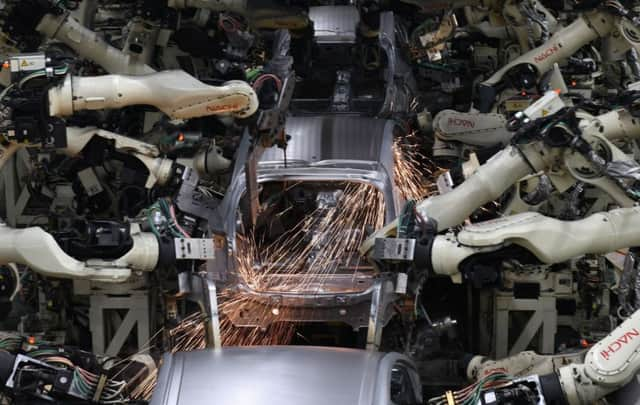Winners and losers from the march of the robots


Quantifying exactly what impact automation will have on the UK workforce continues to the subject of heated debate.
Bank of England governor Mark Carney has warned that the huge technological advances under way could put 15 million Britons out of work, saying many roles would be “hollowed out” and that administrative, clerical and production staff were most under threat.
Advertisement
Hide AdAdvertisement
Hide AdBut there have also been predictions that the rise of the robots could actually create more posts for UK workers. While automation might remove some mundane and repetitive jobs, it can also make a significant contribution to upskilling employees.
Automation also requires significant numbers of programmers and maintenance staff in areas where they may not have been previously necessary.
A survey last year by the Chartered Institute of Ergonomics and Human Factors (CIEHF) found that the majority of professionals in the manufacturing industry – which has used automation for many years – said they have never witnessed job losses as a result of the introduction of robots or automated processes. Indeed, over a third (36.7 per cent) said that artificial intelligence has often resulted in job creation within their place of work.
While the debate rages on about the big-picture impact, a new report out today by the Centre for Cities think tank argues there will be significant geographic implications from the huge changes afoot.
Its Cities Outlook 2018 report found that automation and globalisation could boost jobs in British cities over the coming decades, but will also deepen economic and political divisions across the country, with Northern and Midlands cities more exposed to job losses than those in the South.
The report shows that more than one in five existing jobs in Scottish cities (20 per cent) are likely to be displaced by 2030 as a result of the changes – amounting to around 230,000 jobs in total. This includes 112,700 jobs in Glasgow, 60,800 in Edinburgh, 35,900 in Aberdeen, and 20,000 in Dundee.
In fact, Dundee is among the top ten cities most at risk of losing jobs, but Edinburgh and Aberdeen are seen as better placed to adapt to the changes ahead.
That divergence is partly down to the make-up of the workforce of different cities.
Advertisement
Hide AdAdvertisement
Hide AdAcross all Scottish cities, around 9 per cent of existing jobs are in occupations predicted to grow in future. Moreover, the emergence of new industries will bring new jobs which do not currently exist – just as the rise of sectors such as the IT industry did over the past century.
Edinburgh and Aberdeen are both set to see an upswing in high-skilled jobs as a result of automation and globalisation. In both cities, more than a third of the jobs predicted to grow are in high-skilled private sector occupations, while 29 per cent and 22 per cent are in low-skilled private sector roles in Edinburgh and Aberdeen respectively.
In contrast, more than a third of the jobs set to grow in Dundee (35 per cent) are in low-skilled private sector occupations. In Glasgow, the number of low-skilled jobs set to grow (27 per cent) is also higher than the number of high-skilled jobs (25 per cent).
Occupations predicted to decline by 2030 include sales assistants and retail cashiers, administrative and customer service roles and warehouse jobs.
High-skilled occupations likely to grow include media professionals, engineering roles, hospitality and leisure managers, and natural and social science professionals. Low-skilled roles predicted to increase include catering jobs, electrical and electronic trades and sports and fitness occupations.
According to Andrew Carter, chief executive of Centre for Cities, the figures highlight the urgent need for policymakers to react to the changing landscape.
“Automation and globalisation will bring huge opportunities to increase prosperity and jobs, but there is also a real risk that many people in Scottish cities will lose out. The time to act is now – national and local leaders need to ensure that people in cities across Scotland can share in the benefits these changes could offer,” he said.
“That means reforming the education system to give young people the cognitive and interpersonal skills they need to thrive in the future, and improving school standards, especially in places where jobs are most at risk. We also need greater investment in lifelong learning and technical education to help adults adapt to the changing labour market, and better retraining for people who lose their jobs because of these changes.”
Advertisement
Hide AdAdvertisement
Hide AdCarter said the findings of the report also made it increasingly clear that a one-size-fits-all approach from central government is inadequate to address the myriad issues that different places face. “Cities in Scotland need more powers and resources to tackle the issues that automation and globalisation will present, and to make the most of the benefits they will bring.”